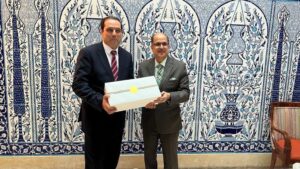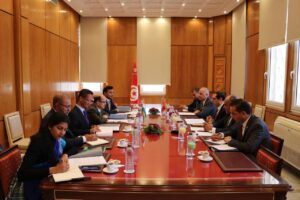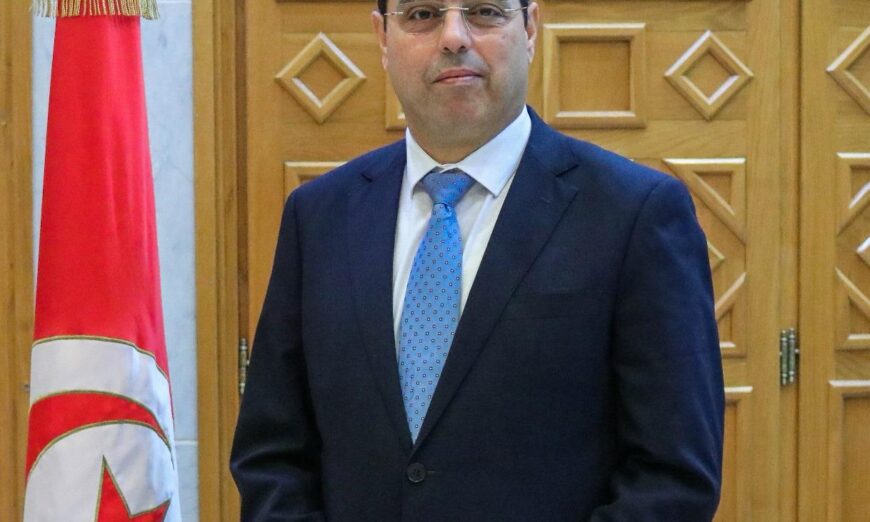During the last few months, Tunisia has witnessed some electoral contests, how important do you think these elections are for strengthening Tunisian democracy?
As it has been announced by H.E. Kaïs Saïed, President of the Republic, all the elections took place as scheduled. Thus, two rounds of elections have been held on 17 and 24 December 2023 Tunisian people went to the elections of parliament members which were followed by the elections of members of regional councils on February 2024, as stated in the 2022 constitution which itself received an overwhelming acceptation rate of over 72.%.
This course is clearly setting up the new path Tunisia is following, which is to restore democracy on its righteous meanings after the decay the Tunisian people witnessed since 2011. A decade during which the State lost a lot of its essence and power with a catastrophic result on almost all levels, economic, social and of course politic.
We are now working very hard, under the guidance of his Excellency the President of the Republic, to restore the image of a vibrant Tunisia, open and a prosperous country very well ready to make giant leaps and that looks to the future with much hope and confidence.
India and the Republic of Tunisia have a long history of strong bilateral relationship. Can you comment on the diplomatic relationship between the two countries since 1958?
Tunisia has always enjoyed cordial and friendly relations with India. Since the establishment of diplomatic relations in 1958, bilateral relations developed significantly in all fields.
The cumulative outcomes of various bilateral high-level visits have added value and substance to our ties. The two countries have in place several bilateral consultative Mechanisms at different levels. Some Joint Working Groups between the two countries have been set up to foster cooperation in core sectors.
Tunisia attaches great importance to expanding, strengthening and deepening its relations with India. A roadmap was adopted, on the sideline of 12th Tunisian-Indian Joint Committee, held in October 2017, to set ambitious goals for developing relations between Tunisia and India in the level of aspirations of the two peoples.
To preserve the upward trend in the bilateral relations, we need to keep high level political contacts to strengthen the political will for a multidimensional partnership.
Investment and joint ventures in both countries are other ways to boost economic relations and promote bilateral trade & investment.
In light of the recent developments in the Middle East, how does Tunisia look at the ongoing situation in Gaza?
Tunisia closely follows with great concern the plight of Palestinian civilians in the occupied Palestinian territories, facing crimes against humanity, systematic genocide, and attempts of persecution and displacement by the oppressive occupation forces in Gaza and settler groups in the West Bank, without the slightest accountability or prosecution, and which constitutes a blatant and unprecedented violation of all international agreements, human values, and ethical principles.
Tunisia calls on the International Community to bear its responsibilities in stopping this aggression, which led to the death of approximately 30,000 civilians, predominantly women and children. Also, Tunisia renews its support for all international efforts aimed at achieving a ceasefire and putting an end to this humanitarian tragedy.
Furthermore, Tunisia reaffirms its unconditional support for the Palestinian people in their rightful struggle, emphasizing that their inalienable rights, immune to expiration, must be reclaimed. Tunisia maintains a steadfast position in solidarity with the Palestinian, advocating for their right to self-determination and the full restoration of their legitimate historical rights.
Due to its strategic geographical location and Tunisia’s close ties with European Union, Tunisia is termed as “Gateway to Europe”. How do you think this Tunisia is set to benefit from this in the near future?
First and foremost, Tunisia and the European Union (EU) had been bound by Economic Agreements since the sixties, but a qualitative leap was made in 1995 with the signing of an Association Agreement, which came into effect in 1998, inaugurating a free-trade area for industrial products, since 2008. This milestone, the first of its kind the EU has taken with a country from the South Mediterranean region, provides the opportunity to grasp the unique nature of the Tunisia-EU partnership. Of course, this relationship is dynamic and has continued to evolve and strengthen over the years. In this regard, a Memorandum of Understanding on a Strategic and Global Partnership between Tunisia and the EU, was concluded in Tunis on July 16, 2023. The MoU encompasses five key pillars: macroeconomic stability, economy and trade, green energy transition, people-to-people contacts, and migration and mobility.
Tunisia is striving for more, aiming for a genuine economic alignment with the European market, aspiring to become one of the most economically integrated external partners with the European Union. As such, it is to be noted that this vision is particularly motivated by our geostrategic position, which naturally grants us the status of “Gateway to Europe”.
Moreover, I would like to highlight that this aim is not a far aspiration but an on-going process we are already fulfilling. Indeed, the shared challenges and the convergence of views have enabled us to reach significant steps towards the electrical interconnection project between Tunisia and Italy (“ELMED”), which accurately demonstrates the potential offered by my country and its commitment to develop renewables with its first economic partner, the EU. Our target is to make Tunisia a prime location for the production of renewable energies.
This ambition is also fueled by the interest shown by the private sector. Indeed, this objective aligns with the dynamism of Tunisian businesses in various fields such as innovation or electronic industries, which already share their expertise with European partners. We hope that these relationships will be framed within an increasing number of “win-win partnerships”, due to enhance with the rise of “friendshoring” and “nearshoring” trends.
Furthermore, Tunisia is actively working to create the most favorable conditions for economic activity of the Tunisian, European, and international private sectors. This includes expanding my country’s network of free-trade agreements, particularly in Africa (memberships in the African Continental Free Trade Area – AfCFTA – and participation to the free trade area of the Common Market for Eastern and Southern Africa – COMESA). As a result, investors with a genuine interest in Tunisia and considering launching projects, are given the opportunity to benefit from a series of incentives, a favorable business climate, a recognized pool of talents and human skills, and an open market that serves as both a regional platform and a gateway between Europe, Africa, and the Middle East.
Tunisian jurist Prof Haykel Ben Mahfoudh became first Tunisian and Arab member of the International Criminal Court (ICC) in December 2023. How shall this serve in aiding Tunisia’s commitment to “achieving international criminal justice for victim”?
Let me appraise this election by context. Today, we are witnessing adversarial times whereby the International Community is facing multiple threats and challenges to global peace and security; one of which is the ongoing spread of atrocities. These appalling crimes make yet another compelling case for the international judicial institutions to deliver; i.e to tackle individual and state wrongdoing, and produce and reproduce just outcomes through law.
The advent of the ICC a quarter of a century ago, carried a lot of hope that lasting justice and peace would be possible through a permanent judicial body that prosecutes and ends impunity of genocide, crimes against humanity, war crimes and aggression that are enshrined in its founding treaty, the Rome Statute. Against this backdrop and considering the current context, Tunisia sees the ICC’s mandate as being crucial and ever more relevant today.
As a state party to the Rome Statute, Tunisia has been steadfast and outspoken in its support for the ICC’s mandate in order to deliver impartial and effective justice, strengthen the rule of law, and contribute to sustainable peace and security across the world.
The election of Prof. Ben Mahfoudh testifies not only to the confidence States parties have put in the Tunisian candidate to make an immediate and valuable contribution to the work of the Court, owing to his integrity and high level of qualifications, but also to the trust and sympathy Tunisia enjoys within the International Community as a peace-loving nation and a strong proponent of international legality and international criminal law.
On a final note, I would say that ICC Arab jurists or officers have been rather scarce, if ever present across the Court’s organs. Therefore, we deem the election of the first Arab judge to the ICC, in the person of Prof. Ben Mahfoudh, as a very important contribution to enhancing fair representation on the bench of the ICC and instilling more diversity in the legal cultures and thinking of the Court, towards the common ultimate goal of reaching universal justice.
Tunisian Minister, Nabil Ammar chaired the 44th Session of the Ministerial Conference of Francophonie in Cameroon, what where some of the key takeaways for Tunisia from this conference?
Tunisia seized this opportunity to reiterate its firm condemnation of the massacre of the Palestinian population in Gaza while calling for an immediate cease-fire along with providing a humanitarian assistance to the Palestinian population.
Mr. Nabil Ammar, Minister of Foreign Affairs, Migration and Tunisians abroad put emphasis on the success of the Djerba Summit coinciding with the celebration of the 50th anniversary of the establishment of the International Organization of Francophonie and its attachment to the principles on which Francophonie is built, chief among which: Solidarity, equality, mutual respect and diversity.
He focused on the urgency to work on common and sustainable solutions for economic and security problems as well as on problems related to migration and environment.
The minister affirmed the authentic character of the Tunisian democratic experience is illustrated by the 2022 new constitution, the introduction of the single member ballot and the future setting up of the second chamber of parliament representing regions and districts.
It should be recalled that Tunisia, in its capacity of President of the Ministerial Conference, took the initiative to include a point in The Yaoundé Resolution on the catastrophic situation in Palestine. In the said point, which was unanimously adopted, Tunisia urged the concerned parties to end all forms of violence against civilian populations together with the preservation of human lives.
The Yaoundé Resolution entitled: “The resolution on good governance at the service of political stability, economic and social prosperity and the cultural impact of the Francophone sphere”, to which Tunisia had actively contributed, It outlines the following:
- The necessity to reinforce Youths and women’s representation in the democratization process.
- The importance of the inclusion of poor countries’ populations in the economic circuits.
- The urgency of preserving Africa’s ecosystem and biodiversity.
- Devising national strategies of sustainable development to fight poverty and to preserve environment resources.
- The resolve to prevent and struggle against radicalization and violent extremism within the Francophone space.
Indian companies have their presence in Tunisia for several years; involved in multiple business ventures. What are some of the key investment opportunities for Indian business groups in Tunisia especially in key segments like fertilizers, Automobile industries, High Tech…?
Indian companies have indeed established a presence in Tunisia over the years, engaging in various business ventures. Here are some key investment opportunities for Indian business groups in Tunisia, focusing on key segments like fertilizers, automobile industries, and high-tech:
Fertilizer Industry: Tunisia has a significant agricultural sector, and there are opportunities for Indian companies to invest more in the fertilizer industry to support agricultural productivity. This opportunity is particularly crucial in the fields of agriculture and food security, where phosphoric acid is widely used as fertilizer. To fully seize this opportunity, Tunisia is considering expanding its production capacity at the TIFERT Plant in Skhira, a joint Tunisian-Indian project led by the CPG (Gafsa Phosphate Company) and the GCT (Tunisian Chemical Group) with a 70% stake from Tunisia and 30% from India. In 2022, Tunisia was India’s 4th supplier, with a market share of 6.5%.
Automobile Industry: automobiles hold a prominent position in the Tunisian economic landscape. Indeed, they constitute a significant portion of imports from India, amounting to 381 million dinars in 2023. This category thus represents 19% of Tunisia’s total imports from India for the period. It is noteworthy that nearly half of these imported vehicles stem from the South Korean brand Hyundai, manufactured in India. Moreover, models of Indian brands such as Mahindra also make their presence felt in the Tunisian market. Some of these models, notably the Mahindra pickup, are even assembled or manufactured locally in Tunisia.
High-Tech Industries: Tunisia has been making efforts to develop its high-tech sector, particularly in areas such as information technology (IT), telecommunications, and electronics. Indian tech companies can explore opportunities for investment and collaboration in software development, IT services, and telecommunications infrastructure projects. Additionally, there may be opportunities for joint ventures or partnerships in research and development initiatives.
Renewable Energy: Tunisia has abundant solar and wind energy resources, making it an attractive destination for investment in renewable energy projects. Indian companies specializing in solar power generation, wind energy technologies, and renewable energy infrastructure could explore opportunities to invest in utility-scale solar and wind farms, as well as off-grid and decentralized energy solutions.
Overall, Tunisia offers a range of investment opportunities across various sectors, and Indian business groups can leverage their expertise, technology, and capital to contribute to the country’s economic development and bilateral relations.
Tunisia has welcomed the celebration of rich Indian culture with keen participation in International Yoga Day and other such celebrations. How do you see this cross deepening the cultural ties between the two countries?
I believe very well that the relations between peoples and the cultural ties between Tunisia and India are very old, Tunisians know a lot about India, as you know modern Tunisia is a continuation of the great civilization of Carthage that dominated the Mediterranean basin since BC, Tunisians are descendants of the Carthaginians, they know well India as one of the most influential civilizations in the world.
On the occasion of hosting the fifth session of the Tunisia –India political consultations, from 16 to 18 May, 2023,which I co-chaired with Mr. Ausaf Sayeed, Under Secretary at the Ministry of Foreign Affairs of India, both countries bilateral ‘Cultural Exchange Programme’ for the period 2023- 2026, This agreement will contribute to raising the level of cultural cooperation between the two countries with regard to participating in cultural events and organizing of Tunisian cultural days in India and Indian cultural days in Tunis to further introduce and promote the two diversified cultures and civilizations of both friendly countries.



